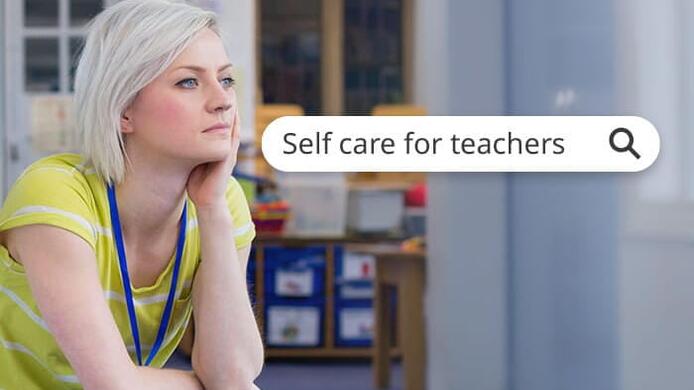Explore our resources for teaching and education degrees and learn about career options that fit your future.

Educators are some of the most passionate people you’ll meet in any profession, and it’s easy to understand why. Teachers get to introduce children to concepts, people and places that will shape their lives forever. When your lesson goes well and the class is engaged and attentive, it can feel like you’re on top of the world.
But teaching is also an emotionally, mentally and physically taxing job that puts educators at risk for compassion fatigue, burnout and even early resignation. That’s why self-care for teachers is essential and should be normalized as a routine practice.
Keep reading to gain a better understanding of the dangers of compassion fatigue and helpful teacher self-care tips that have the potential to make a big difference in your life.
What Is Compassion Fatigue in Teaching?
Educators are highly empathetic individuals who work in trauma-adjacent environments. The things that good teachers do — listening to students, trying to understand their situation, helping them overcome challenges — often result in second-hand stress. Feeling responsible for students’ problems is part of the job. But when it becomes overwhelming, you run the risk of developing compassion fatigue, which can cause disruptive, depressive or irritating symptoms if left unchecked.
What Is Burnout vs Compassion Fatigue?
Compassion fatigue is the physical, emotional and psychological impact of supporting others through stressful or traumatic experiences. It is most common in healing and helping professionals like therapists, nurses, doctors, social workers and teachers. If left unaddressed long-term, it could lead to burnout — a long-term onset of hopelessness and feeling like your work has little value or positive impact.
What Are the Symptoms of Compassion Fatigue?
Individual symptoms will vary but can include:
- Excessive blaming
- Bottled up emotions
- Isolation from others
- Substance abuse to mask feelings
- Compulsive behaviors such as overspending, overeating or gambling
- Reoccurrence of nightmares and flashbacks to traumatic events
- Chronic physical ailments such as gastrointestinal problems and recurrent colds
- Apathy, sadness and difficulty concentrating
- Denial about problems
If you recognize any of these signs in yourself or the people you care about, don’t despair. There are many ways to combat compassion fatigue before it escalates further.
5 Ways to Practice Self-Care for Educators
While self-care is a highly personal endeavor, there are some tried and true practices that teachers and psychologists frequently recommend. The strategies below are informed by conversations with Dr. Michael Vallejo, teacher on special assignment at the Huntington Beach Union High School District and adjunct professor at UMass Global, and Dr. Thierry Kolpin, practicing mental health clinician and associate professor at UMass Global.
Consider their advice on self-care for teachers:
1. Strengthen Your ‘Mindfulness Muscle’
Dr. Kolpin explains that psychologists are trained to think about halting problems before they start. For counselors, students, clinicians and educators alike, the best empirically validated programs all cite self-care as the most critical form of prevention.
One of the best strategies to minimize stress, according to Dr. Kolpin, is adopting mindfulness as a daily habit. He views mindfulness as an umbrella term that encompasses a variety of activities: yoga, meditation, praying, breathwork, keeping a gratitude journal or even surfing. To get the most of your mindfulness practice, choose an activity that helps you to engage in a contemplative thought process and focus on the present moment.
2. Prioritize Getting a Good Night’s Sleep
Most adults fare best when they get at least seven hours of sleep every night. But unfortunately, many people find rest to be elusive if they are already stressed out.
“Not getting enough sleep or having an erratic sleep schedule will eventually have an adverse effect on your ability [to] care for yourself and others. It messes up your serotonin levels and makes existing depression and anxiety even worse,” Dr. Kolpin explains. “Sleep isn’t a remedy to fix everything, but it is essential for prevention. Your resilience goes way up when you get enough rest.”
3. Build Movement and/or Exercise Into Your Day
Sometimes when you become overworked, things that were once essential — like your daily bike ride — seem less important. But if you’re already feeling stressed, you may want to think twice about skipping your workout. Decades of research have proven that just 30 minutes of movement a day can have a hugely positive impact on your wellbeing.
For an added boost to your mental and physical health, get outside and enjoy the outdoors. A recent study found that the calming, healing effects of nature can be felt in as little as 10 minutes.
As a school leader and mentor to several new teachers, Dr. Vallejo strives to lead by example, especially when it comes to making movement part of his daily routine. He started offering “walk and talk” sessions instead of meeting in the office, and so far, they have proven to be a big hit. “We still have great conversations, but now we can end our days in a much better mood,” Dr. Vallejo reflects.
4. Set and Maintain Boundaries to Preserve Work-Life Balance
Teachers often find it difficult to “leave work problems at work” for a variety of reasons. Most of their school day is spent teaching and prepping, which often means taking administrative tasks home to work on in the evenings and weekends. They interact with kids nearly every day and are sometimes the first to notice when a child is suffering.
For Dr. Vallejo, the hardest part about being a teacher is meeting the daily needs of a diverse group of students without giving too much of himself. “In my early days of teaching, it wasn’t uncommon to stay late at night — I even slept at school twice,” he recalls. “I thought I was meeting my student’s needs, but I was sacrificing my health and wellness.”
He admits that he still struggles to find balance at times but recognizes how important it is to establish strong boundaries, stating that:
Teaching is my life’s work, but it can be all-consuming if you let it.
Dr. Vallejo frequently reminds himself and fellow educators that teaching is a marathon, not a sprint. The goal is to find a pace that’s going to be sustainable over decades instead of “just trying to make it to June” every single year.
5. Reach Out for Help
The only thing worse than struggling is doing so all by yourself. Achieving self-care for educators requires a willingness to admit when you’re overwhelmed and need assistance. As Dr. Vallejo puts it,
Teaching is arguably the most important profession because it impacts all other professions. For students to be well, their teachers and leaders need to be well.
Advocating for your own needs and asking for help — whether it’s from your loved ones, colleagues, a therapist or your supervisor — simply means you value your own health.
Prioritize Self-Care for Teachers
As the common saying goes, “You can’t pour from an empty cup.” You’ve devoted your entire life to educating and empowering young people, and you can’t fulfill your purpose if you’re not prioritizing your own well-being. Commit to these teacher self-care habits to avoid educator burnout and continue nurturing the next generation of learners.
If you’re looking to apply your passion in a new way, perhaps it’s time to start exploring other careers in education. Take a look at your options in our article "Alternative Careers for Teachers: Opportunities to Leverage Your Existing Skills."








